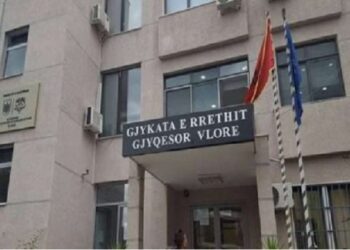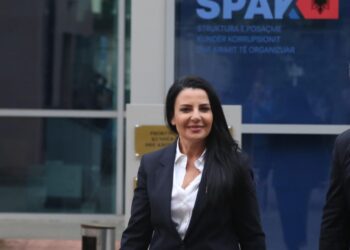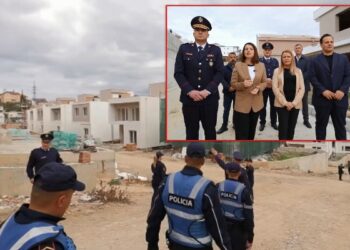By Boldnews.al
The two top executives of the justice system find it difficult to justify the extradition of a narcotics gang financier known as “Habilaj”.
After the Minister of Justice, Etilda Gjonaj, and the Interim Chief Prosecutor, Arta Marku tried to justify the illegal extradition of the key man in the “Tahiri-Habilaj” investigation.
But Attorney General Arta Marku went too far in her stance on the matter. She lied about the extradition of the Habilaji gang financier during an interview on Sokol Balla’s “Real Story” show. The chief of the prosecution said during an interview on Vision Plus that Seitaj was detained in connection with the arrest of the Catania Prosecutor’s Office. Mark also said that Nazer Seitaj was extradited, based on the procedures developed before her arrival at the Office of the Chief Prosecutor, on 18 December 2017.
To make it more convincing in what he was saying, Arta Marku referred to some of the letters she was holding at the table during the interview. For both of these claims, Arta Marku publicly stated false data, which contradicts the official documents of the justice institutions.
Nazer Seitaj was detained by order of the Serious Crimes Prosecution on dt. October 19, 2017. This is fully proven by the Serious Crimes Court’s decision to impose a “jail arrest” security measure on him.
The decision states that: “… At 16:30 on 19.10.2017, the Judicial Police, pursuant to the order of the prosecutor, detained the citizen Nezar Seiti, suspected of committing the criminal offense of” Trafficking in narcotics “, committed in co-operation” , in the specific form of a structured criminal group provided for in Articles 283 / a / 2 and 333 / a of the Criminal Code.
So, Nazer Seitaj was detained by order of the Albanian Prosecutor’s Office. It is impossible for Arta Marku to be unaware of this circumstance. Her statement at the Sokol Balla studio that Nazer Seitaj was arrested on the basis of a Katania Prosecutor’s order is false.
She also attempted to justify herself in the case of the extradition proceedings of the “Habilaji financier” to Italy, at a time when he was being held by the Serious Crimes Court in Albania. Arta Marku explained that the decision to extradite Nazer Seitaj had been made before she took on the role of Interim Chief Prosecutor.
In fact, on December 18, 2017, the very day she was voted in Parliament, the Tirana court allowed Nazer Seitaj’s extradition to Italy at the request of the Catania Prosecutor’s Office. At the same time, the security measure imposed by the Serious Crimes Court in relation to the investigations carried out by the Albanian Prosecutor’s Office was in force against Seitaj.
Article 500 of the Code of Criminal Procedure obliges the Minister of Justice to suspend and postpone the extradition of a citizen on a timely basis if he has a security measure and is under investigation or pending trial by the Albanian authorities.
The Ministry of Justice is made aware of other possible measures against persons who will be extradited from verifications of its institution, as well as from the General Prosecutor’s Office. But the Interim Attorney General did not inform the Ministry of Justice that there was a security measure in place by the Albanian authorities against the “Habilaji financier”.
In an official announcement on this case, the Ministry of Justice clarifies that: “… the General Prosecutor’s Office dated 10.01.2018 has notified the Ministry of Justice regarding the decision of the Tirana Judicial District Court no. 1506, dated 18.12.2017, which has become final on 29.12.2017, approving the request of the Prosecutor’s Office of the Tirana Judicial District to allow the extradition of citizen Nezar Seiti … ”.
Thus, the Ministry of Justice acknowledges that the General Prosecutor’s Office, on January 10, has only informed him of the extradition permit. The letter to the Ministry of Justice, signed by Arta Marku, who had been in office for about a month, makes no mention of the fact that Nazer Seitaj also had a security measure from the Serious Crimes Court.
In this way, the Chief Prosecutor was not at all honest in her first interview, when she had to answer the question of Habilaji’s financier. Moreover, it stated false data, in an attempt to justify a completely unlawful act committed by it and subsequently by the Minister of Justice.
The two main leaders of justice institutions allowed the extradition of Nazer Seitaj, inflicting a severe blow on the Albanian Prosecutor’s Office, which has suspected members of the Habilaj narco-trafficking gang and former Interior Minister Saimir Tahiri.















